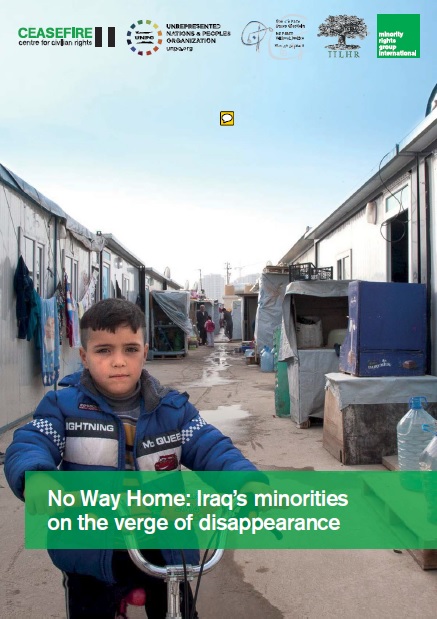4 July 2016
Minority communities in Iraq are now on the verge of disappearance, says a new joint report by No Peace Without Justice, the Unrepresented Nations and Peoples Organization, Institute for International Law and Human Rights and Minority Rights Group International.
No Way Home: Iraq’s Minorities on the Verge of Disappearance documents how tens of thousands of persons belonging to Iraq’s ethnic and religious minorities have been murdered, maimed or abducted, including unknown numbers of women and girls forced into marriage or sexual enslavement, after the fall of Mosul in June 2014. The report is based on extensive interviews and field research and is a follow-up report to Between the Millstones: The State of Iraq’s Minorities Since the Fall of Mosul, published in February 2015.
According to the international rights organisations, the Christian population, which before 2003 numbered as many as 1.4 million, is now under 250,000. Most of the Yezidi and Kaka’i have been forced from their traditional lands and are now internally displaced or have fled the country altogether, whilst Shi’a Turkmen and Shabak have been driven to the south.
Islamic State of Iraq and al Sham (ISIS) forces and commanders have committed war crimes, crimes against humanity and genocide, summary executions, killing, mutilation, rape, sexual violence, torture, cruel treatment, the use and recruitment of children, outrages on personal dignity, as well as using chemical weapons says the report. Whilst Iraqi Security Forces, Popular Mobilization Units and Kurdish Peshmerga have also committed war crimes prohibited under international law.
“It’s unthinkable that crimes of this magnitude and impact are being committed with total impunity. The Government of Iraq really needs to take urgent steps to provide redress to the victims – referring the situation to the International Criminal Court would be a good start”, says Alison Smith of No Peace Without Justice.
‘Thirteen years of war have had devastating long-term consequences for Iraqi society. The impact on minorities has been catastrophic. Saddam was terrible; the situation since is worse. Tens of thousands of religious and ethnic minorities have been killed and millions have fled for their lives,’ says Mark Lattimer, Minority Rights Group International’s Executive Director.
‘Families are destroyed. Homes, businesses and farms have been looted. Heritage is either demolished or sold. Survivors will have nothing to return to, unless Iraq and the international community take more robust action to address the crushing needs of minorities,’ says William Spence Spencer, of the Institute for International Law and Human Rights.
‘Iraq’s minority communities are feeling increasingly disillusioned and disappointed not only with the Government of Iraq and Kurdistan Regional Government, but also with the UN. This situation of protracted displacement is causing further tensions to an already dire situation, which highlights the urgent need for a long-term focus that goes beyond immediate security and relief,’ says Johanna Green of the Unrepresented Nations and Peoples Organization.
As ISIS swept through the Ninewa plains in the summer of 2014, the local population fled quickly. Latest reports indicate that approximately 3.4 million individuals, including over 1 million school-aged girls and boys, are now displaced, making Iraq the country with the highest number and fastest growing rate of people displaced in the world in 2015. Overall, the United Nations estimates that 10 million people have now been affected by displacement and are in need of humanitarian assistance.
Many uprooted by the violence within Iraq hoped they would be able to return home within a relatively short timeframe. However, internally displaced persons interviewed by the rights organisations said that the lack of basic services and security in many locations mean that as many as one in five of them feel that they have no choice but to flee the country.
The report makes key recommendations to alleviate the humanitarian crisis and prevent future human rights abuses, as well as making proposals on justice, reconciliation and asylum issues, and improving institutions and legislation.
The report also says that the anticipated displacement from a possible effort to retake Mosul could total as many as 1 million over the next year, and the international community could witness the flight of hundreds of thousands of further refugees in 2016 alone.
- Download the report (in pdf format)
For further information, please contact Nicola Giovannini on ngiovannini@npwj.org or +32-2-548-3915.
For interviews with report authors:
Alison Smith, No Peace Without Justice (Brussels, Belgium)
M: +32 486-986-235 – E: asmith@npwj.org
Johanna Green, Program Manager, Unrepresented Nations and Peoples Organization (Brussels, Belgium)
M: +32(0)48 371 3993 – E: j.green@unpo.org
William Spence Spencer, Institute for International Law and Human Rights (Washington DC, USA)
M: +1 (202) 365 1124 – E: wspencer@lawandhumanrights.org
Mark Lattimer (London, UK – English) contact: Emma Eastwood, Senior Media Officer, Minority Rights Group International (London, UK); E: emma.eastwood@mrgmail.org – T: +44 2074224205 – M: +44 7989699984 – Twitter: @MinorityRights
Mays Al-Juboori, Civilian Rights Officer, Minority Rights Group International (London, UK)
M: +44 7792070984 – E: mays.al-juboori@mrgmail.org
For interviews with Iraq partners:
Pascale Warda, President of Hammurabi Human Rights Organisation, Former Minister of Migration and Displacement, Member of Iraqi Women Network, Member of the Committee for Reconstruction of Sinjar (Iraq – English, French, Arabic)
M: +964 7513760474 – E: pascale.isho@gmail.com
Dr. Hunain Mahmood A. Al-Qaddo, Member Of Iraqi Parliament, Deputy Chair of Migration and IDP’s Committee, Chairman Of Iraqi Minorities Council (Iraq – English, Arabic)
M: +964 7902297342 – E: hunain_alqaddo@yahoo.co.uk




